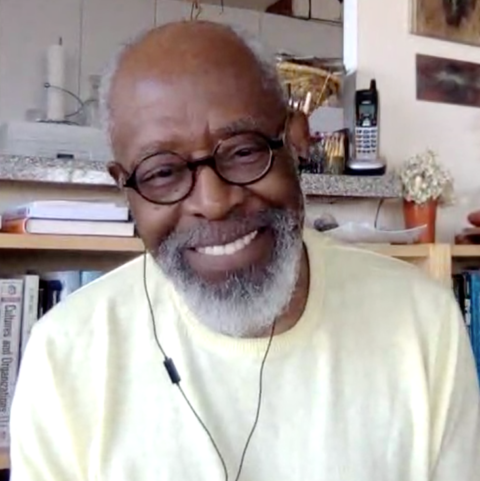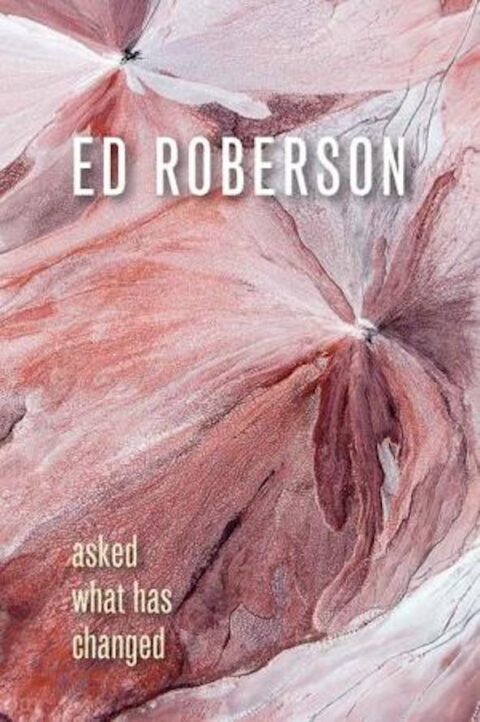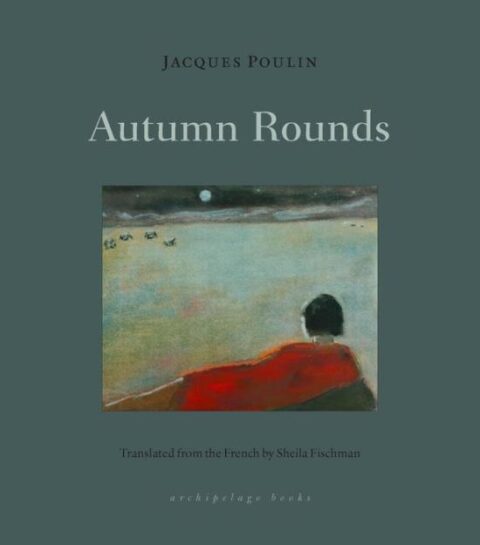In the fall of 2017, when the Block Museum at Northwestern University opened an exhibit of William Blake’s etchings, four Chicago poets were invited to produce poems based on Blake’s motif of the earth as garden. Ed Roberson responded with “asked what has changed,” later selected by him as the title poem of his eighth collection. The poem begins, “Even staring out the window is changed.” In one of those moments Cesare Pavese called “the usual coincidence,” I was re-reading Roberson’s To See the Earth Before the End of the World (2010, Wesleyan) when Asked What Has Changed arrived here. The speculative gesture of peering at the sky is a Roberson signature, as in the second section of the earlier book’s poem “The World, Then”:
Facing up to
the night sky is way off
is a vertigo of falling up
off the face of
not so much the earth’s off into space as off
any hold that was ourselves together
in what balance lasting in the stars.
See
through the bore column of straight up
to the end of the stars –
That we could be lost
that deeply that we could lose all of thus far
by this far our moment here’s far
off.
Then in another section, with the Milky Way above: “It’s over our head / But (a small thing) lose your balance, you fall / into that dark shirt never pulled off your head.” A vast detachment and benightedness are at work in the humans, a willingness to lose the world. What has changed is both the nature of our seeing and the degree of danger; there may still be an element of tranquility in our contemplations, but something rumbles within them. The final lines of “asked what has changed” verge on indictment — though the harshly direct commentary in the lines below are atypical of a Roberson poem:
And now that seas are adding themselves
into the land, horizons look ominously larger,
the arrivant out of them, faster and clearer.
Now, you see the view is turned on us to frame
human agency become transparent,
light as air, before the picture blackens
as a consequence of our seeing too much
of it as only for us to use and then
use up.
The eye is not filled with seeing, with only
seeing, but with understanding the sight.
 In another sky-watching piece, “here” (2011), he writes, “You don’t see the poem // saying anything you can’t see in it” – which points us directly toward Roberson’s postmodernist poetics, his practice for six decades. A long habit of responsiveness to his habitat, its elements and details – household, city, countryside, rugged terrain – has produced many of our ur-poems of the Anthropocene. But his poems are neither “about” the environment nor a morally pristine persona who seeks credit for caring about it. Roberson invests instead in a process on the page, generating intellectual and sonic structures intended to create a shaken-up collective awareness.
In another sky-watching piece, “here” (2011), he writes, “You don’t see the poem // saying anything you can’t see in it” – which points us directly toward Roberson’s postmodernist poetics, his practice for six decades. A long habit of responsiveness to his habitat, its elements and details – household, city, countryside, rugged terrain – has produced many of our ur-poems of the Anthropocene. But his poems are neither “about” the environment nor a morally pristine persona who seeks credit for caring about it. Roberson invests instead in a process on the page, generating intellectual and sonic structures intended to create a shaken-up collective awareness.
once the magnolia has blossomed
Once the magnolia blossoms,
the descending shadow of the petals
stains the street
with the brown footprint leaving,
where it has stepped in itself,
a track
walked in its own being flesh
gone as to excrement –
spring, in tomorrow’s rain, comes,
a hose-down of the scene as
of an annual
murder,
the fallen petal
of a sparrow
no one had kept an eye on except
the peregrine
from the Methodist church tower.
A hose-down as hope
this has to do with something
about the plant cycle
of sublime season done not sacrifice
to some stoned possession for blood
spent on the street,
and so much lost you’d think
beauty had left a lesson
more than more is there to ask for.
If anything has changed by way of asked what has changed, perhaps it is the flaring of Roberson’s own lyric resources in response to fire, storm surge, rotating funnels – as well as to the urban depths beyond his high-rise apartment window. A leap in a Roberson poem is also a suture — and the leaps in “once the magnolia has blossomed” are as dynamic as the jump from “spring” to a “sublime season done” – the blood and feathers hosed-down, in a way, by the elevated recognition of this most natural pivot to summer solstice. The lesson never exceeds “more” than what is already there – in the scene, in the materials of the poem, in the breath of the obscured yet permeable figure.
 Roberson’s attention doesn’t waver between nature and culture; he has always indicated the correspondences and dependencies between them. But sometimes, his eye on the street in Chicago peers directly at the perils lurking there: “I don’t turn onto this street because it can turn on me / its howling reflex of stepped on its history / it turns on me my government’s police gunshot // when I am unarmed and haven’t done anything.” Writing on Roberson in Chicago Review, Patrick Morrissey and Andrew Peart noted that while Roberson identified with and has employed the “idiomatic and realist-observational modes” of the Black Arts Movement, he never considered himself a true participant in it due to “his sense that the elements of a black aesthetic – music, speech, direct communication – should have a different role in the poem than that of cultural signifiers.” Roberson insists that those features must be presented in a radical lyric framework that erodes our expectations for linear progression toward epiphany and promotes a word-environment that both inhabits – and opens another way into — our lived-in environment. The poem is a moment of coherence – the act of making an immediate utterance cohere with an actual world.
Roberson’s attention doesn’t waver between nature and culture; he has always indicated the correspondences and dependencies between them. But sometimes, his eye on the street in Chicago peers directly at the perils lurking there: “I don’t turn onto this street because it can turn on me / its howling reflex of stepped on its history / it turns on me my government’s police gunshot // when I am unarmed and haven’t done anything.” Writing on Roberson in Chicago Review, Patrick Morrissey and Andrew Peart noted that while Roberson identified with and has employed the “idiomatic and realist-observational modes” of the Black Arts Movement, he never considered himself a true participant in it due to “his sense that the elements of a black aesthetic – music, speech, direct communication – should have a different role in the poem than that of cultural signifiers.” Roberson insists that those features must be presented in a radical lyric framework that erodes our expectations for linear progression toward epiphany and promotes a word-environment that both inhabits – and opens another way into — our lived-in environment. The poem is a moment of coherence – the act of making an immediate utterance cohere with an actual world.
One of Roberson’s earliest works, MPH and Other Road Poems, has also just been published by Verge Books. The manuscript of the book had been lost for decades. MPH takes up a motorcycle trip Roberson took in 1970, riding from Pittsburgh to San Francisco. “The principle of motorcycles is to keep moving / to stay up,” he wrote then – a line that resonates with another one in his “Black Poetry”: “don’t you know black people always thought / we were continuous in any form.” And now, as an elder poet observing the world from his aerie high up in Bronzeville, Roberson continues as a poet working in the open, weaving sequences, layering effects, and enacting the seriality of provocative thought.
[Published by Wesleyan University Press on March 2, 2021, 85 pages, $24.95 hardcover, $15.95 paperback]
* * * * *
 The Gaspé Peninsula of Quebec forms the southern shore of the St. Lawrence River above New Brunswick. An eight-hour drive takes you from Quebec City to the tip of the peninsula at Percé. This is the route taken three times a year – spring, summer, fall — by the bookmobile operator called The Driver who works for the Ministry of Culture. With movable shelves, a kitchen nook and sleeping space, the bookmobile was fashioned from a Ford commercial van by his father, now deceased. The residents of the small towns and villages on the coast depend on The Driver for the books they love. Preparing to depart his apartment in Quebec City for the summer tour, The Driver hears music in the street below – musicians, clowns, jugglers, a singer and a black dog are approaching. He goes out for a look and meets Marie, the group’s road manager: “She had curly grey hair and a bony face like Katherine Hepburn’s. A beautiful face. A mixture of tenderness and strength.” The Driver, too, is gray-haired; he and Marie are the same height, adore the same books, and use the same terms to describe them. Kismet.
The Gaspé Peninsula of Quebec forms the southern shore of the St. Lawrence River above New Brunswick. An eight-hour drive takes you from Quebec City to the tip of the peninsula at Percé. This is the route taken three times a year – spring, summer, fall — by the bookmobile operator called The Driver who works for the Ministry of Culture. With movable shelves, a kitchen nook and sleeping space, the bookmobile was fashioned from a Ford commercial van by his father, now deceased. The residents of the small towns and villages on the coast depend on The Driver for the books they love. Preparing to depart his apartment in Quebec City for the summer tour, The Driver hears music in the street below – musicians, clowns, jugglers, a singer and a black dog are approaching. He goes out for a look and meets Marie, the group’s road manager: “She had curly grey hair and a bony face like Katherine Hepburn’s. A beautiful face. A mixture of tenderness and strength.” The Driver, too, is gray-haired; he and Marie are the same height, adore the same books, and use the same terms to describe them. Kismet.
We learn all of this in the opening pages of Autumn Rounds, the eighth of Jacques Poulin’s 14 novels (first published as La tournée d’automne in 1993) and the third of his books to be translated by Sheila Fischman for Anglophones. Since 1967, just eight of the novels have been translated — 74.8% of Canadians speak English and only 1.2% speak both English and French.
Marie, who has made her living as a painter of birds, and the entertainers have come from France. The troupe wants to travel north up the river’s coast to see the spectacular vistas, and Marie asks The Driver if they may follow him there. In this way, Autumn Rounds proceeds as a travelogue as well as a simple tale. The Driver keeps a black notebook with details of his “network,” an informal but functional means of distributing books in each village through a local coordinator. The narrative pivots between his friendly encounters with village readers, and meeting up with the troupe and Marie at points along his route. Soon he and Marie are spending many hours driving together.
 Autumn Rounds is a novel in part about discretion. The Driver is bashful, but not timid. He treats Marie with great tact, sensitive regard, and attention to her preferences. The two of them ask questions of each other, but never intimate ones. Is such background information even necessary to one who intuitively recognizes the other as a partner? Consequently, we know very little about the two of them. In turn, Poulin’s style is discreet. He knows he has us in his gentle grip but he will not intrude with privileged knowledge of his characters’ interiors. Everything proceeds with a placid vibe. The Driver and Marie show affection to each other in tender gestures. They relax in the van, sipping hot chocolate.
Autumn Rounds is a novel in part about discretion. The Driver is bashful, but not timid. He treats Marie with great tact, sensitive regard, and attention to her preferences. The two of them ask questions of each other, but never intimate ones. Is such background information even necessary to one who intuitively recognizes the other as a partner? Consequently, we know very little about the two of them. In turn, Poulin’s style is discreet. He knows he has us in his gentle grip but he will not intrude with privileged knowledge of his characters’ interiors. Everything proceeds with a placid vibe. The Driver and Marie show affection to each other in tender gestures. They relax in the van, sipping hot chocolate.
And yet … Poulin can darken the tone, but when he does so, it is with great delicacy:
“That business about getting old,” he said, “I didn’t want to talk about it but since I brought it up … There are a couple of things I have to say, to explain. And then I won’t talk about it anymore.”
She let him know that she was ready to listen.
“I’m not sick,” he said. “My health is neither good nor bad, it’s acceptable. As far as age is concerned, I’m no longer young but I’m not an old man either. Still, I’ve lived long enough to know that everything people say about our golden years, wisdom, serenity – that’s all totally false. At my age I haven’t learned any of the essential things – the meaning of life, good and evil … It’s as if my experience boils down to nothing. I’m exaggerating, but not much, I swear. Even worse, I still have the same fears, the same desires, the same needs that I had as a child. When the physical problems come along – and they’re inevitable – it will be disaster, ruin. That’s what I don’t want to live through. It doesn’t interest me. And that’s that, I won’t talk about it ever again.”
The autumn rounds are in question. The Driver has “dark thoughts.” Everything we experience as readers in Autumn Rounds may seem so tentative, even insubstantial, as to make it impossible to predict an outcome. And that may be Poulin’s wish — that like The Driver and his amorous passenger, we’re simply pleased to be there, too, with the beautiful riverscape to our left as we drive north. This narrative, produced with such a light touch, has a beguiling effect – a muffled anxiety at its core, a surprising life-or-death debacle in miniature. Marie has cared for the street circus, The Driver has cared for his village readers — is it our care for others that qualifies us to care for ourselves?
I’ve never used the term “endearing” in a review to describe a novel. But there it is.
[Published on November 30, 2021 by Archipelago Books, 216 pages, $18.00 paperback]